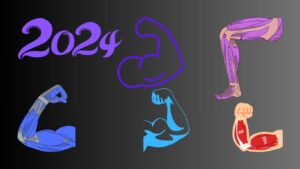In your quest for a stronger, more muscular body, it is important to understand the intricacies of muscle development and use effective strategies. This article discusses scientific and practical methods to build muscle mass quickly and effectively.

Understanding muscle growth
Mechanisms of muscle hypertrophy
Muscle hypertrophy, the process of muscle growth, occurs through mechanisms such as muscle fiber recruitment, where more muscle fibers are activated during exercise, and protein synthesis, where new proteins are produced to repair and grow the muscle. muscle tissue. Click here.
Factors that affect muscle growth
The rate of muscle growth is influenced by several factors, including genetic predisposition, diet, and training intensity. Although genetics play a role in determining a person’s muscle growth potential, good nutrition, and targeted training can improve muscle growth.
Nutrition to develop muscle mass
eat protein
Protein is essential for muscle recovery and growth. Optimal protein intake from high-quality sources, such as lean meats, eggs, and plant proteins, supports muscle protein synthesis. Timing protein intake during exercise can improve muscle recovery and adaptation. Visit here.
Carbohydrates and energy
Carbohydrates provide the energy needed for intense workouts and replenish glycogen stores depleted during exercise. Strategic consumption of carbohydrates, especially before and after exercise, improves performance and promotes muscle recovery.
Balance of fats and hormones.
Healthy fats play a key role in regulating hormones, including testosterone production, which affects muscle growth. Including healthy sources of fat in your diet, such as avocados, nuts, and fatty fish, promotes optimal hormonal balance for muscle development.
Effective learning strategies
Endurance training
Weight training stimulates muscle growth by subjecting muscles to tension and stress. Incorporating compound exercises that target multiple muscle groups and gradually increase resistance promotes muscle hypertrophy.
Frequency and intensity
A balance between training frequency and volume is essential for muscle recovery and growth. Structuring your workouts with adequate rest periods and sufficient volume promotes muscle adaptation while reducing the risk of overtraining.
Variations and adaptations
Variation in exercise selection and intensity interferes with adaptation and stability of muscle growth. The use of periodization techniques and various training variables allows the muscles to remain active and respond to stimuli.
Recovery and rest
Sleep and muscle recovery
Getting good sleep is vital for muscle recovery and growth. Adequate restful sleep promotes hormonal regulation and protein synthesis, which improves muscle recovery and performance.
Active recovery methods.
Incorporating active recovery strategies, such as stretching, mobility exercises, and foam rolling, improves circulation, reduces muscle soreness, and speeds recovery between workouts.
Supplements for muscle growth
Protein supplements
Protein powder supplements, such as whey protein and casein, are convenient sources of high-quality protein to support muscle recovery and growth, especially for those with higher protein needs.
Creatine supplements
Creatine supplements improve ATP regeneration, increasing energy availability for high-intensity exercise. Loading phases followed by maintenance doses optimize creatine stores, resulting in increased strength and muscle mass.
Mind-muscle connection
Focus
Developing a strong mind-muscle connection improves physical performance and muscle activation. Practicing visualization and awareness techniques during training improves focus and communication with affected muscles.
Muscle activation and control
Maintaining proper form and technique during exercise increases muscle activation and reduces the risk of injury. Focusing on muscle contraction and control improves neuromuscular efficiency and overall training effectiveness.
Avoid common mistakes
Overtraining
Overtraining can stunt muscle growth and cause injury and fatigue. Recognizing the signs of overtraining, such as persistent fatigue and decreased performance, and prioritizing adequate rest and recovery are critical to long-term progress.
Malnutrition
A poor diet compromises muscle growth and recovery. A balanced diet containing adequate calories, protein, carbohydrates, and fat promotes optimal performance and muscle growth.
Track your progress
Set goals
Setting specific, measurable, achievable, relevant, and time-bound (SMART) goals provides direction and motivation for your muscle-building efforts. Setting short- and long-term goals ensures progress and accountability.
Performance monitoring
Tracking progress through methods such as progress photos, measurements, and training logs allows you to objectively assess muscle growth and training effectiveness. Periodic evaluation of performance indicators allows you to adapt training and nutrition strategies.
conclusion
Building muscle fast requires a multi-faceted approach that includes nutrition, training, recovery, supplementation, and mental health. By understanding the principles of muscle growth and implementing effective strategies tailored to individual needs, you can achieve significant increases in muscle size and strength. Consistency, dedication, and patience are the keys to achieving your muscle-building goals and reaching your full potential.





